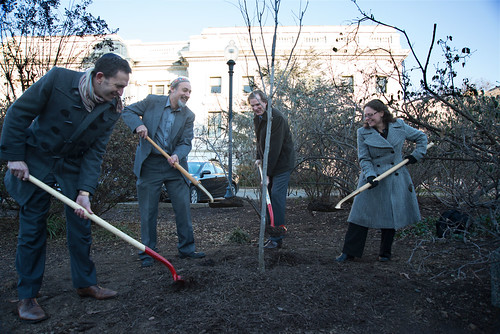
Dignitaries from the White House and USDA held a tree planting ceremony Thursday beside the National Mall to commemorate Tu B’Shevat, the Jewish New Year of the Tree. Thinking about the people planting that young Redbud tree to honor the conservation ethic of the Jewish community, I was reminded of just how important trees are to all of us.
In my job as the Chief of the U.S. Forest Service, I’m charged with leading the agency that manages 193 million acres of forests that belong to the American people, as well as providing assistance in the management of 500 million acres of state and private forests and 100 million acres of urban forests. That’s a tremendous responsibility for the agency, one that often requires thinking in terms of the big picture, and how our decisions will impact the landscape in 30, 50, or even 100 years.
The fact is, trees are tremendously important for all of us. In our forests, they provide rich habitats, capture storm water and help counteract the effects of climate change. But did you know that urban trees provide the same benefits? Trees in our communities help keep our rivers clean, filter our city air, and provide millions in savings on energy costs. Many people are unaware that trees properly placed around buildings can reduce air conditioning needs by 30 percent and save 20 to 50 percent in energy used to heat our homes and offices.
There are organizations in almost every town dedicated to helping volunteers plant trees in their communities. Tree-plantings can be a wonderful experience for the whole family, and help carry forward the conservation ethic inherent in Tu B’Shevat. The Arbor Day Foundation and American Forests are good resources to help you find a local tree event.
The Forest Service also offers a free online software suite that not only tells you what your neighborhood trees are doing for you, but can also help you decide where in your yard to plant a tree to reap the most benefits.
Trees are being planted in celebration of Tu B’Shevat all over the world, and it’s my hope that these events will introduce more people to the good they can do in their communities by volunteering to plant trees.
We should all share the conservation values represented by Tu B’Shevat, the New Year of the Tree – our wellbeing, and the wellbeing of our children and grandchildren, depend on it.
